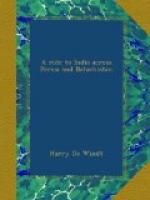CHAPTER II.
THE CASPIAN—ASTARA—RESHT.
I arrived in Baku on (the Russian) New Year’s Eve, and found railway officials, porters, and droshki-drivers all more or less fuddled with drink in consequence. With some difficulty we persuaded one of the latter to drive us to the hotel, a clean and well-appointed house, a stone’s throw from the quay. Our Isvostchik [A] was very drunk. His horses, luckily for us, were quiet; for he fell off his box on the way, and smilingly, but firmly, declined to remount. Gerome then piloted the troika safely to our destination, leaving Jehu prone in the mud.
Baku, a clean, well laid-out city of sixty thousand inhabitants, is the most important town on the shores of the Caspian. Its name is said to be derived from the Persian words bad, “the wind,” and kubeda, “beaten,” signifying “Wind-beaten;” and this seems credible, for violent storms are prevalent along the coast. The town is essentially European in character. One can scarcely realize that only fifty years ago a tumble-down Persian settlement stood on the spot now occupied by broad, well-paved, gas-lit streets, handsome stone buildings, warehouses, and shops. Baku has, like Tiflis, a mixed population. Although Russians and Tartars form its bulk, France, Germany, Italy, Greece, Turkey, and Persia are all represented, most of the Europeans being employed in the manufacture of petroleum. The naphtha springs are said to yield over 170,000 tons of oil yearly.
A French engineer, Mr. B——, whose acquaintance I made at the hotel, described Baku as terribly monotonous and depressing to live in after a time. There is not a tree or sign of vegetation for miles round the town—nothing but bleak, desolate steppe and marsh, unproductive of sport and cultivation, or, indeed, of anything save miasma and fever. In summer the heat, dust, and flies are intolerable; in winter the sun is seldom seen. There is no amusement of any kind—no cafe, no band, no theatre, to go to after the day’s work. This seemed to distress the poor Parisian exile more than anything, more even than the smell of oil, which, from the moment you enter until you leave Baku, there is no getting away from. Although the wells are fully three miles away, the table-cloths and napkins were saturated with it, and the very food one ate had a faint sickly flavour of naphtha. “I bathed in the Caspian once last summer,” said Mr. B------, despairingly, “and did not get the smell out of my skin for a week, during which time my friends forbade me their houses! Mon Dieu! Quel pays!”
The steamer for Enzelli was to leave at eleven. Having wished my French friend farewell, and a speedy return to his native country, we set out for the quay. The night was fine, but away to our left dense clouds of thick black smoke obscured the lights of the town and starlit sky, while the furnaces of the “Tchornigorod” [B] blazed out of the darkness, their flames reflected in the dark waters of the Caspian, turning the little harbour into a lake of fire.




